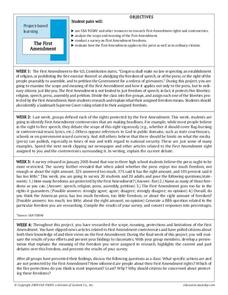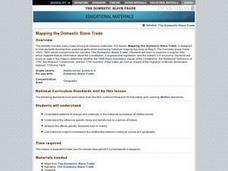University of Arkansas
Assessment and Discussion
"Without concerned citizen action to uphold them (human rights) close to home; we shall look in vain for progress in the larger world. . ." Eleanor Roosevelt's comment is used to set the stage for the conclusion of a five-lesson unit...
Curated OER
Bill of Rights
Students work in collaborative groups to research an amendment of the Bill of Rights. They then design and present a skit that demonstrates and communicates the core values and concepts of the amendment to the class.
Close Up Foundation
Rights Auction
In an engaging activity on universal and unalienable rights, learners work in groups to establish a democratic nation and determine what principles they want to protect to ensure a democratic society. They conduct a "rights auction" in...
Judicial Learning Center
The Power of Judicial Review
Marbury v. Madison is arguably the most important landmark case in the history of the Supreme Court. A fact-filled lesson provides background information about the case and two others related to the concept of judicial review. Scholars...
K12 Reader
Responsibilities of Citizenship
Your pupils are all citizens of your classroom. Provide some more instruction on how people can be citizens with the reading passage included here. After reading, learners answer the five related questions.
State Bar of Texas
Gideon v. Wainwright
How does a trial begin without a lawyer for the defendant? The 1963 Supreme Court case Gideon v. Wainwright serves as the backdrop for the study of the rights of the accused. Scholars use a short video along with paired discussion and...
Judicial Learning Center
Types of Court Cases
How can one court acquit someone of a crime, while another convicts the person of the same one? It's all because of the differences between civil and criminal trials. An informative resource provides scholars in the field of criminology...
City University of New York
Electoral College
A presidential election is a lot like the 2004 World Series, and it's also a lot like choosing an orange in a paper bag. Apply the process of the electoral college to these two analogies with a set of lessons about government...
Judicial Learning Center
Your 1st Amendment Rights
Why should classes care about the First Amendment? An engaging lesson serves as a powerful tool for answering just that. As all four cases in the lesson relate directly to freedom of expression in schools, young scholars explore the...
Judicial Learning Center
Your 4th Amendment Rights
Americans love to learn about their rights, especially those that protect them from the government's power to invade their privacy. Young people are especially engaged by this topic. An informative lesson explores four Supreme Court...
Southern Poverty Law Center
Teaching Hard History: A Framework for Teaching American Slavery
Pupils investigate American slavery from colonial times through the Civil War. They incorporate primary sources, video clips, and firsthand accounts to understand how the slavery issue gripped the nation. Essays, presentations, and...
Curated OER
The Federalist Debates: Balancing Power Between State and Federal Governments
Young scholars examine the pros and cons of state sovereignty vs. federalism, as argued by the Founding Fathers. They identify the basic positions of each side, complete a worksheet, and write a persuasive essay arguing for Jefferson or...
Theodore Roosevelt Association
Interpreting the Past; Assessing Its Impact on the Present
Even though the presidency of Theodore Roosevelt ended over 100 years ago, we can still learn something from his stances and policies that is applicable today. Class members first look over a list of prevalent political issues from the...
Curated OER
Democratic Process, Constitutional Issues, Local Government
Twelfth graders engage in the decision making process so as to encourage them to become active citizens upon graduation from high school.
Curated OER
US & Iroquois Constitution Parallels
Eighth graders identify and compare the stated purposes of the Iroquois and US Constitutions, and their roles as living documents.
Curated OER
War of 1812 Begins
In this United States history worksheet, students utilize a word bank of 10 terms or phrases to answer 10 fill in the blank questions about the beginning of the War of 1812. A short answer question is included as well.
Curated OER
The President's Role and Succession
Fourth graders examine the role the President of the United States plays in American government and the order of succession of cabinet members. They explain about presidential qualifications and the path to becoming President.
Curated OER
History of the Bill of Rights
Students study the history of the Bill of Rights. In this Bill of Rights lesson, students read and use two handouts to learn about the history of the Bill of Rights. Students then work in groups to study the Bill of Rights. Students then...
Curated OER
Bill of Rights
Students define the Bill of Rights, identify and explain each amendment, and explain why these amendments were included in the Constitution.
Curated OER
Civil War and Reconstruction
Fourth graders investigate the Civil War by researching the state of Virginia. In this US History lesson, 4th graders identify Abraham Lincoln, James Chestnut and Fort Sumter, and discuss their roles in the start of the Civil War. ...
Curated OER
The First Amendment
Eleventh graders examine the First Amendment. In this US Government lesson, 11th graders analyze the scope and meaning of the first amendment. Students conduct a survey on First Amendment freedoms. Student evaluate the First Amendment.
Curated OER
The Turbulent 1960s (5)
In this online interactive American history worksheet, students respond to 14 matching questions regarding 1960's America. Students may check their answers immediately.
Curated OER
Mapping the Domestic Slave Trade
Middle schoolers develop their analytical skills when examining historical maps. They examine a map for data which supports textual information about the Constitution, Congressional legislation, and the historic U.S. economy.
Curated OER
Search and Seizure: What Does It Mean?
Students, in a juvenile correctional facility, study the meaning of the Fourth Constitutional Amendment. They study definitions and complete worksheets to investigate the implications of the amendment.

























